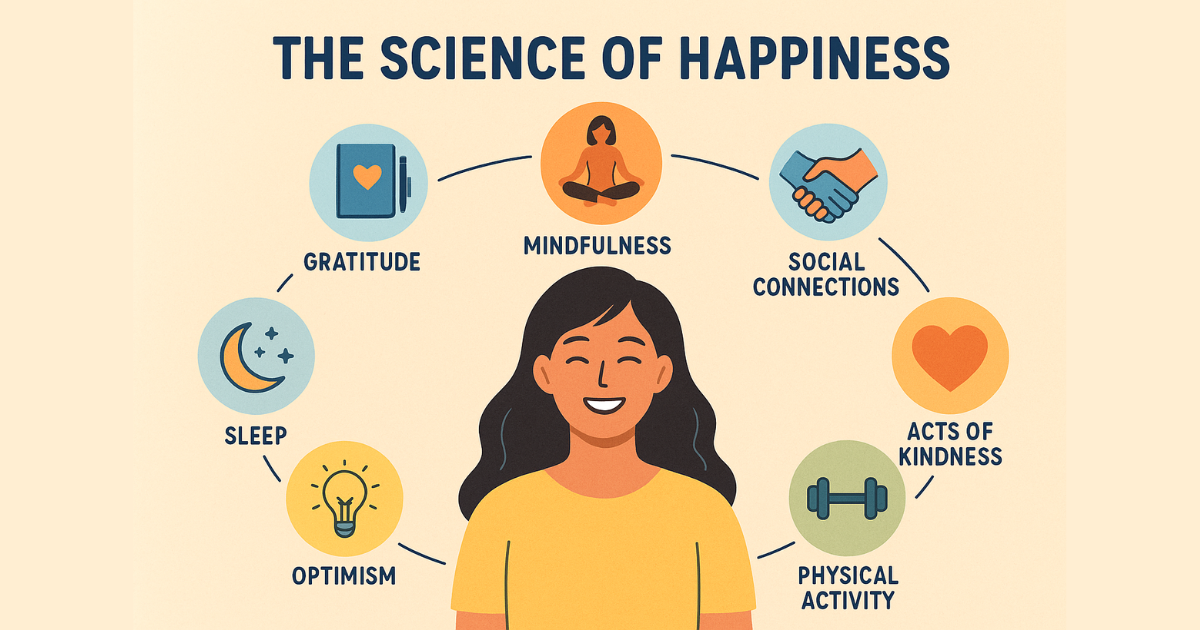What You Need to Know About the Science of Happiness
Happiness is not a fleeting emotion; it’s a state of health that is shaped by the things we think, do, and keep doing. For a long time, psychologists have studied what makes people happy. What they have found is interesting and useful. A lot of the time, people believe that money, fame, or success are the only things that can make them happy. A study found that the decisions and habits we make every day give us almost 40% of our happiness.
We’ll talk about the science behind happiness and things that psychologists say can make your mental health a lot better in this post.
1. Being thankful: teaching your mind to see the good
Another simple and strong way to be happy is to be thankful. It can help your brain focus on the good things if you write down three things you’re grateful for every day.
How it works: Dopamine and serotonin, the “feel-good” chemicals, go up when you are thankful, and stress hormones go down.
To get better at it, write down what you’re grateful for, thank other people, or think about good times before bed.
If you’re sad, write a simple “thank you” note to someone who helped you. You’ll both feel better afterward.
2. Being aware and meditating: the power of now
Often, our thoughts jump back and forth between worried about the future and feeling bad about the past. Being mindful brings us back to the present, which is where true happiness lies.
A Harvard study found that people think about something other than what they’re doing 47% of the time they are awake. This mind-wandering is linked to being unhappy.
Being mindful can help you feel less anxious, concentrate better, and be content with your life in general.
Good habit: meditating every day for 10 minutes can make you feel much better.
3. Making strong ties with other people
It has always been known in psychology that relationships are a big part of being happy in the long run. The famous Harvard Study of Adult Development looked at people for more than 80 years and found that strong social ties are more important for happiness than money or fame.
Why it’s important: Being with family and friends can make you feel better, less lonely, and happy with your life.
Make time for people you care about, have deep conversations, and put connection ahead of technology.
Don’t forget that happiness can spread. You are more likely to feel good when you spend time with happy people.
4. Being Kind: Giving Makes You Happy
It makes you happy to help other people, and it makes them happy too. Psychologists call this feeling the “helper’s high.”
The science: When you do nice things, your brain’s reward system is activated.
Giving money, your time, or even small things like keeping the door open are examples.
Kindness brings people together and makes them feel like they have a reason in life.
Do this: Do one nice thing for no reason every day. It might be as easy as telling someone they look good.
5. Moving Around: Exercise Can Make You Happy
Working out is good for more than just your body; it can also help boost your mood.
Endorphins make you feel good, and exercise can help with worry and depression.
People who work out at least three times a week are happier than those who don’t say so.
Every day, taking a 30-minute walk, doing yoga, or dancing to your favorite music can help a lot.
Extra tip: To get even more health benefits, do something active in outdoors, like hiking.
6. Learning to be happy and think positively
Being optimistic doesn’t mean avoiding problems; it means having a good mood about them.
The reason this is important is that positive people are generally stronger, healthier, and live longer.
To practice, think of bad thoughts as chances to learn. Don’t say “I failed,” say “I learned what doesn’t work.”
Researchers have found that changing how you talk to yourself can have a direct effect on your mental health.
7. Sleep: Forgetting about the happiness pill
Many people don’t understand how important sleep is for their well-being. You’ll feel bad, lose focus, and not be able to handle stress if you don’t get enough sleep.
A study from the University of California found that people who don’t get enough sleep are 60% more likely to act on their bad feelings.
Make it a habit to sleep well every night for 7 to 9 hours. Stick to your bedtime, make a pattern every night, and don’t use electronics right before bed.
Happy people who get adequate sleep are not only easier to talk to and more attractive, but they also appear more appealing.
What Meaning and Purpose Have to Do with Being Happy?
Things that make you happy in the short term might make you happy in the long term, but having a mission is what makes most people happy. Viktor Frankl, author of Man’s Search for Meaning, is one of many experts who say that having a reason for living is useful for mental health.
Why it matters: Having a purpose gives you drive, power, and a sense that you belong.
To find it, think about what you love, what you’re good at, and what you stand for. Make sure that your job, friends, and hobbies all fit with these.
How to Use the Science of Happiness in Your Everyday Life
The following steps will help you make all of these habits a daily part of your life:
Happiness at Any Time of Day How You Spend Your Morning Today, write down three things that make you grateful: Take a 10-minute break to pay attention. Talk to someone at work or a friend.
Every night before bed, work out for 30 minutes. Think of a nice thing you did before you go to sleep.

Business Consultant | Web designer & Developer | Social media Manager | SEO | Passionate Learner, I am deeply passionate about learning and continuously improving my skills.
My interests are diverse, ranging from music and singing to computers and programming languages, digital art, AI


